Ditapis dengan
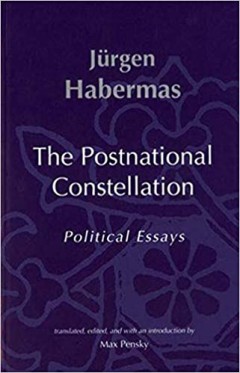
The Postnational Constellation: Political Essays
translated, edited, and with an introduction by Max Pensky Does a global economy render the traditional nation-state obsolete? Does globalization threaten democratic life, or offer it new forms of expression? What are the implications of globalization for our understanding of politics and of national and cultural identities? In The Postnational Constellation, Jürgen Habermas addresses these an…
- Edisi
- First Published
- ISBN/ISSN
- 0-262-08297-7
- Deskripsi Fisik
- xix + 190 pgs.; 23 cm.
- Judul Seri
- -
- No. Panggil
- 320.101 HAB p
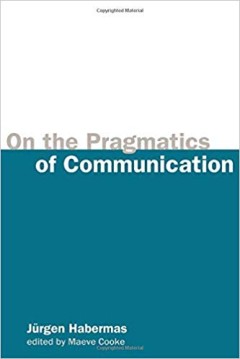
On The Pragmatics Of Communication
This anthology brings together for the first time, in revised or new translation, ten essays that present the main concerns of Jürgen Habermas's program in formal pragmatics.Jürgen Habermas's program in formal pragmatics fulfills two main functions. First, it serves as the theoretical underpinning for his theory of communicative action, a crucial element in his theory of society. Second, it c…
- Edisi
- First Published
- ISBN/ISSN
- 0-262-08265-9
- Deskripsi Fisik
- viii + 454 pgs.; 21 cm.
- Judul Seri
- -
- No. Panggil
- 193 HAB p
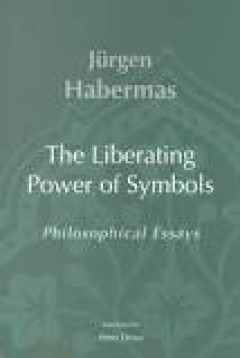
The Liberating Power of Symbols: Philosophical Essays
In this collection, Jurgen Habermas engages with a wide range of twentieth-century thinkers. The essays display Habermas's appreciation for various intellectual traditions, his ability to distill the essence of other authors' work, and his outstanding critical powers.Habermas has described these essays as "fragments of a history of contemporary philosophy." They include explorations of the work…
- Edisi
- First Published
- ISBN/ISSN
- 0-262-8296-9
- Deskripsi Fisik
- vi + 130 pgs.; 27 cm.
- Judul Seri
- -
- No. Panggil
- 193 HAB l
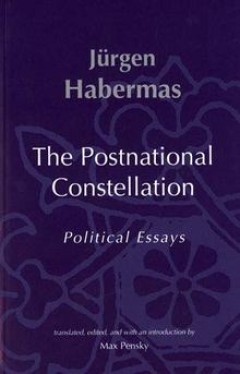
The Postnational Constellation: Political Essays
translated, edited, and with an introduction by Max Pensky Does a global economy render the traditional nation-state obsolete? Does globalization threaten democratic life, or offer it new forms of expression? What are the implications of globalization for our understanding of politics and of national and cultural identities?In The Postnational Constellation, Jürgen Habermas addresses these and…
- Edisi
- -
- ISBN/ISSN
- 0262082977
- Deskripsi Fisik
- xix + 190 pg.; 28,5 cm.
- Judul Seri
- -
- No. Panggil
- 320.101 HAB p
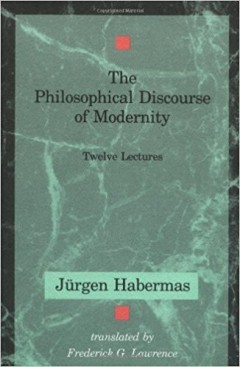
The Philosophical Discourse of Modernity: Twelve Lectures
The Philosophical Discourse of Modernity is a tour de force that has the immediacy and accessibility of the lecture form and the excitement of an encounter across, national cultural boundaries. Habermas takes up the challenge posed by the radical critique of reason in contemporary French poststructuralism. Tracing the odyssey of the philosophical discourse of modernity, Habermas's strategy is t…
- Edisi
- -
- ISBN/ISSN
- 0745608302
- Deskripsi Fisik
- xx + 430 pg.; 21 cm.
- Judul Seri
- -
- No. Panggil
- 190 HAB p
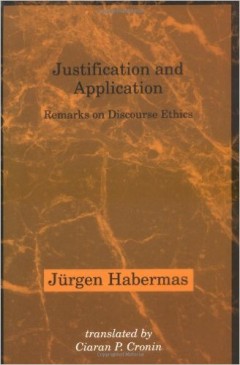
Justification and Application: Remarks on Discourse Ethics
This collection of four essays and an interview contains Habermas's most recent contributions to ethical theory. It expands and clarifies the work on discourse ethics presented in Moral Consciousness and Communicative Action. Here, largely in response to criticisms from contemporary neo-Aristotelians, Habermas underscores the claim of discourse ethics to a preeminent position in contemporary mo…
- Edisi
- -
- ISBN/ISSN
- 0262082179
- Deskripsi Fisik
- xxx + 197 pg.; 21 cm.
- Judul Seri
- -
- No. Panggil
- 170 HAB j
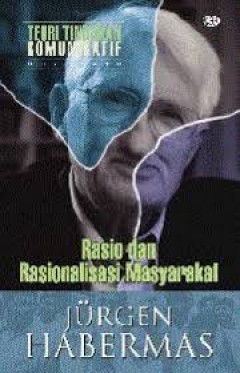
Rasio dan Rasionalisasi Masyarakat
Modernitas perlu dikritik, karena membuat dunia-kehidupan terjajah. Kebebasan dan keadilan , kebahagiaan dan realisasi-diri yang dicita-citakan semakin menjauh, sementara manusia makin takluk oleh kuasa ilmu pengetahuan dan teknologi. Anomi, alienasi, rancunya identitas dan rapuhnya eksistensi adalah bukti yang tak bisa dipungkiri. Parahnya lagi, tempat menggantungkan harapan nyaris tidak ada, …
- Edisi
- -
- ISBN/ISSN
- 9793722797
- Deskripsi Fisik
- lii + 512 hlm.; 24 cm.
- Judul Seri
- Teori Tindakan Komunikatif
- No. Panggil
- 149.7 HAB r

Between Naturalism and Religion: Philosophical Essays
Two countervailing trends mark the intellectual tenor of our age the spread of naturalistic worldviews and religious orthodoxies. Advances in biogenetics, brain research, and robotics are clearing the way for the penetration of an objective scientific self-understanding of persons into everyday life. For philosophy, this trend is associated with the challenge of scientific naturalism. At the sa…
- Edisi
- -
- ISBN/ISSN
- 9780745638249
- Deskripsi Fisik
- 361 pg.; 28,5 cm.
- Judul Seri
- -
- No. Panggil
- 146 HAB b
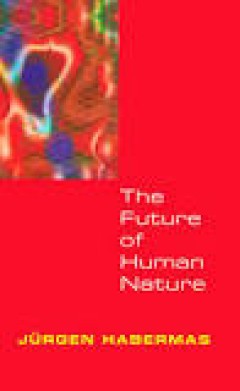
The Future of Human Nature
Recent developments in biotechnology and genetic research are raising complex ethical questions concerning the legitimate scope and limits of genetic intervention. As we begin to contemplate the possibility of intervening in the human genome to prevent diseases, we cannot help but feel that the human species might soon be able to take its biological evolution in its own hands. 'Playing God' is …
- Edisi
- -
- ISBN/ISSN
- 0745629865
- Deskripsi Fisik
- viii + 127 pg.; 29 cm.
- Judul Seri
- -
- No. Panggil
- 128 HAB f
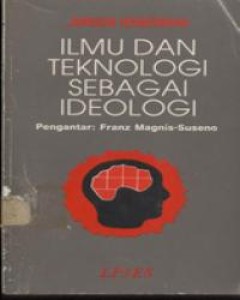
Ilmu dan Teknologi Sebagai Ideologi
Salah satu unsur inti teori kritis yang menjadi ciri pemikiran Jurgen Habermas adalah pandangan bahwa dibelakang selubung obyektivitas ilmu-ilmu tersembunyi kepentingan-kepentingan kekuasaan. Penyelidikan tuntas untuk memahami hubungan antara ilmu pengetahuan dan kepentingan ini menjadi salah satu usaha pokok Habermas dalam rangka melihat hakikat ilmu dan teknologi.
- Edisi
- -
- ISBN/ISSN
- 9798015754
- Deskripsi Fisik
- xxix + 180 hlm.; 17,5 cm.
- Judul Seri
- -
- No. Panggil
- 121 HAB i
 Karya Umum
Karya Umum  Filsafat
Filsafat  Agama
Agama  Ilmu-ilmu Sosial
Ilmu-ilmu Sosial  Bahasa
Bahasa  Ilmu-ilmu Murni
Ilmu-ilmu Murni  Ilmu-ilmu Terapan
Ilmu-ilmu Terapan  Kesenian, Hiburan, dan Olahraga
Kesenian, Hiburan, dan Olahraga  Kesusastraan
Kesusastraan  Geografi dan Sejarah
Geografi dan Sejarah